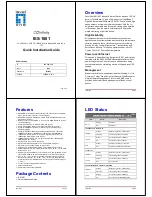
Chapter 30 Green Ethernet
XGS1930 Series User’s Guide
230
C
HAPTER
30
Green Ethernet
This chapter shows you how to configure the Switch to reduce the power consumed by switch ports.
30.1 Green Ethernet Overview
Green Ethernet reduces switch port power consumption in the following ways.
IEEE 802.3az Energy Efficient Ethernet (EEE)
If EEE is enabled, both sides of a link support EEE and there is no traffic, the port enters Low Power Idle
(LPI) mode. LPI mode turns off some functions of the physical layer (becomes quiet) to save power.
Periodically the port transmits a REFRESH signal to allow the link partner to keep the link alive. When there
is traffic to be sent, a WAKE signal is sent to the link partner to return the link to active mode.
Auto Power Down
Auto Power Down
turns off almost all functions of the port’s physical layer functions when the link is
down, so the port only uses power to check for a link up pulse from the link partner. After the link up
pulse is detected, the port wakes up from
Auto Power Down
and operates normally.
Short Reach
Traditional Ethernet transmits all data with enough power to reach the maximum cable length. Shorter
cables lose less power, so
Short Reach
saves power by adjusting the transmit power of each port
according to the length of cable attached to that port.
30.2 Configuring Green Ethernet
Click
Advanced Application
>
Green Ethernet
in the navigation panel to display the screen as shown.
Note: EEE, Auto Power Down and Short Reach are not supported on an uplink port.
















































